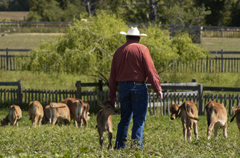Small operation runs with 50 cows
In an age where small family-owned dairies are being pushed to
the side by industrial 24-hour milking factories a small, 50-cow
dairy is plotting out a new home deep in the Panoche Valley at the
southern end of San Benito County.
Small operation runs with 50 cows
In an age where small family-owned dairies are being pushed to the side by industrial 24-hour milking factories a small, 50-cow dairy is plotting out a new home deep in the Panoche Valley at the southern end of San Benito County.
Claravale Farms has been operating continuously since 1927 and prides itself as the only milk that is available on the shelf that has not been altered in any way. The milk that Claravale dairy produces is not homogenized, not standardized, and it is not fortified.
“Basically we take it out of the cow and put it in the bottle,” said Claravale Farms owner Ron Garthwaite who purchased the dairy in 1996 with his partner Collette Cassidy.
The original owner of the dairy started it in Los Gatos and kept the dairy until he was well into his 90s. At that time, Garthwaite and Cassidy purchased the dairy and moved it to Santa Cruz County. When they moved the dairy to Santa Cruz County, they spent the next 11 years trying to secure the correct permits for their site. They had to move to the Monterey Bay Academy in the meantime until they could locate a permanent location.
When the opportunity arose to move the dairy to San Benito County, Garthwaite and Cassidy leaped at the opportunity.
“We’d been looking for a new location for a while,” Cassidy said. “The zoning here in the county was optimal and very supportive of small farms. The climate was good and dry and the land is beautiful.”
Historically dairies were smaller, so a 50-cow dairy now considered “boutique,” was actually a normal size operation 40 years ago.
The dairy market has changed in San Benito County during the past 40 years and while it is no longer financially viable for many family dairies to continue to operate, Claravale is not in competition with any of the larger dairies.
Earlier this year, retired dairyman Ray Lanini who was in the dairy business for 25 years talked about the challenges of continuing to operate a small family dairy competing with the corporate dairies.
Lanini said some of the mega-dairies have 2,000 to 3,000 cows and milk 24-hours-a-day; it’s pretty hard to compete with that, Lanini said.
In fact, Claravale Farms is the only dairy in California that features Jersey cows; the traditional type of fornia that features Jersey cows; the traditional type of heifer used for milking. Most dairies now use Holsteins, since they can produce larger quantities of milk, but often the milk is more watered down and less pure.
In light of the size of the dairy, Claravale Farms can hardly keep up with the demand from specialty stores selling their high-end milk. The milk is especially desirable to people who oppose factory farming and people who prefer a higher-quality milk product. Claravale Farms milk is available at most Whole Foods markets and from New Leaf Community Market in Santa Cruz as well as other high-end natural foods stores.
Claravale Farms features whole milk, a low-fat variety and cream, but has no plans to expand into any dairy products beyond this due to limitations. With only 50 cows in their stable there is only so much milk to be produced, Garthwaite said.
Neither Cassidy nor Garthwaite had any commercial agricultural experience before 1997. The dairy was something they stumbled into, they said. Garthwaite had a background in research and genetics and Cassidy was and still is an acupuncturist, but both had an interest in the health benefits of quality milk. Garthwaite had also been a friend of the previous owner, which is how the two knew the dairy was available.
“It really was a case of being in the right place at the right time,” Cassidy said.
“Ron was interested in the historical aspects. This is the way that milk has always been produced so we didn’t want to stray from that. This is how quality milk is produced.”
Claravale Farms has to be at their new location by June 30, because that is the date they have to be out of their former site, but they will continue developing once they get situated in San Benito.
For more information on where to find Claravale Farms milk contact Collette Cassidy at co*************@***oo.com or call her at 772-7779.









